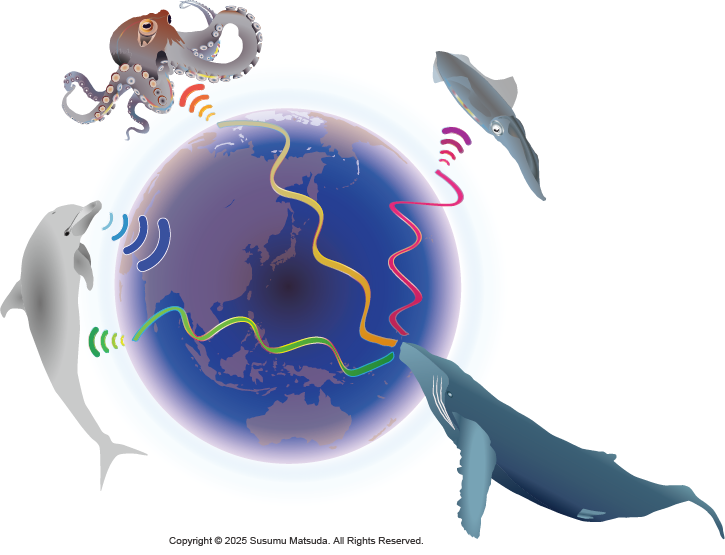This time, we will focus on marine life that lives in the water environment. Whales and dolphins are representative marine life that are closest to humans. Whales and dolphins are social mammals that sense distance and surrounding conditions through ultrasound and sound echoes, a method of echolocation. Whales communicate by emitting melodic sounds and transmitting between each other. It is known that sound waves are transmitted faster in water than in the atmosphere. The method by which whales communicate using sound waves in the sea is an excellent way to transmit information faster and over longer distances. Recently, there was a theory that whale language is superior to that of humans. It is known that whales and dolphins that live in the sea cannot use their sense of smell very much, losing some of their sense of smell and having a weak sense of smell. Therefore, whales and dolphins have developed senses other than smell. Dolphins and whales are unique creatures that have evolved hearing and ultrasonic senses.

We will also look at cephalopods such as octopuses and squids. It is thought that the ancestors of cephalopods are nautiluses. Nautilus is thought to have appeared in the Cambrian period of the Paleozoic era. Cephalopods evolved from shellfish, and nautilus has a shell. Squid has bones on cartilage, and some octopuses have a bone called a stylet, which is thought to be a remnant of the shell. Octopuses and squids have camera eyes that are very similar to human eyes, but their eye structure is very different from that of humans. Octopuses and squids have no blind spots. In the sea, their eyes are used not to distinguish colors but to recognize light and shapes, so they have evolved in a different way from human eyes. Cephalopods that look different from humans have many things in common with humans, and evidence that they were derived from the same organism has been confirmed in the DNA of octopuses and squids. Both are marine organisms that have evolved sensory organs to specialize in the environment in which they live, but they were originally derived from the same organism. Marine organisms evolve sensory organs to adapt to the environment, capture the surrounding situation with their sensory organs, and live while generating emotions of life and death. Octopuses are non-social organisms that act individually. Some octopuses live in groups, but they are similar to cats that have their own territory. On the other hand, squids, like whales and dolphins, are social creatures that live in groups. It is useful to learn about the senses of various creatures that have evolved in environments different from ours while surviving on Earth. It is very important to continue learning about the evolution of the sensory organs of each creature and the mechanism of emotion generation that determines life and death through the sensory organs in order to think about peace of mind.
Please note: References are provided in the Japanese blog with Amazon links.